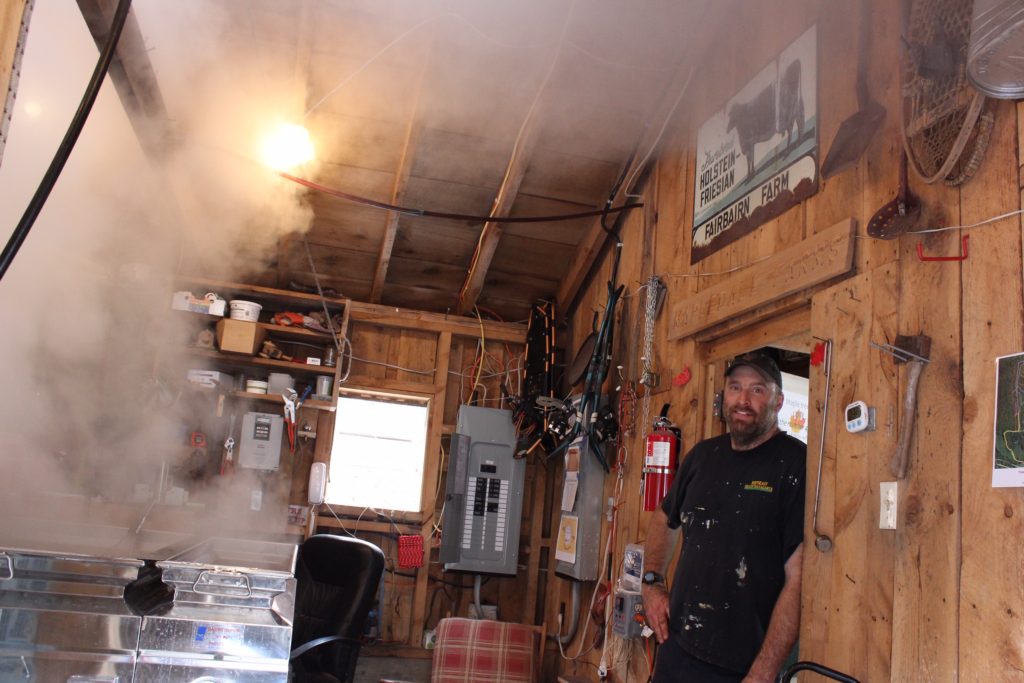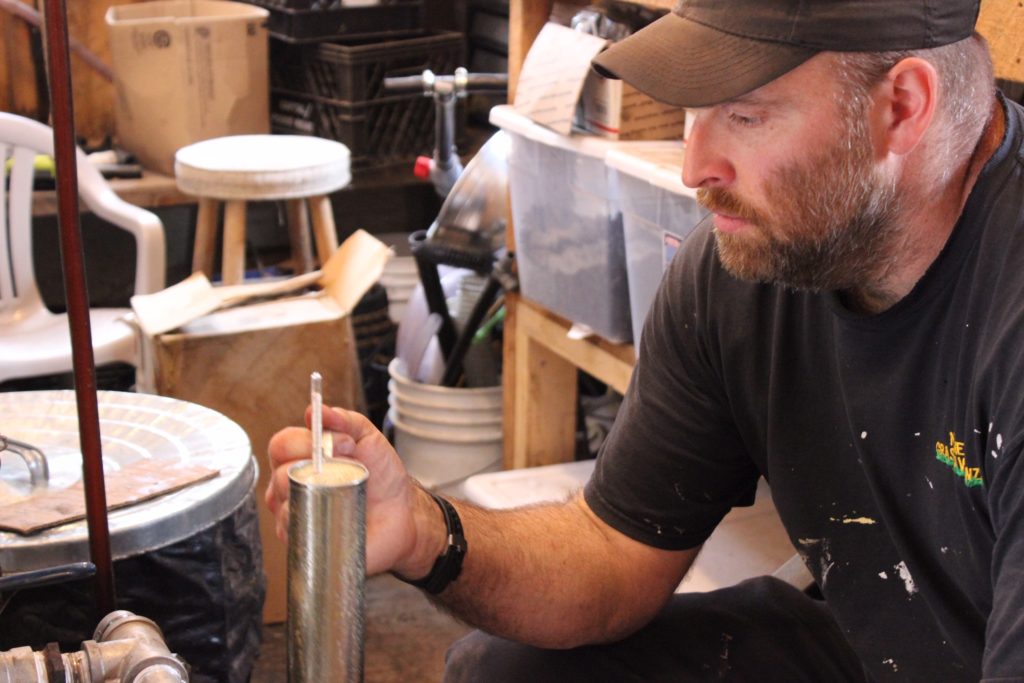
We’re living in extraordinary times, wherein a global pandemic is the new normal and locals here in the Catskills are choosing, or have chosen by default, families and colleagues with whom to quarantine for the foreseeable future. Covid-19 has been rare in our pocket of the mountains with roughly 100 cases in Delaware County, but a region that was already isolated, once again, has become more insulated. Pandemic pods or social bubbles are common, one such bubble being the Tree Juice Maple Syrup bubble.
Covid-19 emerged right during sap season and the Tree Juice team couldn’t afford to halt production, so they quarantined while still working at the sap house on Lazy Crazy Acres Farm in Arkville, Upstate New York, owned by Jake Fairbairn. You probably couldn’t imagine a cuter or nicer team than the four members of TJ hunkered down over the frigid months of February and March, shoving wood around the clock (every 8 minutes) into the sap boiler after having tapped 7500 trees, and together producing over 2400 gallons of maple syrup.
Jake, co-founder of Tree juice Maple Syrup lives on Lazy Crazy Acres, the Fairbairn family farm, which was established in 1841.
JN: How does it feel to be part of history?
JF: Old? I also feel like there’s a sense of responsibility that comes with it.
JN: How does that affect your decision-making?
JF: That’s such a hard question. I’ve been trying to figure that out. The sense that this responsibility is bigger than just me, this lineage that I get to pass on to my kids. But I try to do it in such a way that I’m not putting something on them either, which is awkward.
JN: What main aspects of your history would you pass on to your kids?
JF: I’ve never tried to put it into words. It’s just like this visceral connection. I think Miller is already feeling it. He loves farming in general – he wants to grow up and be a farmer, which is pretty much exactly how I was at that age. Find a way to do what you love and find a way to make it work. The farm has to morph and change with the times. I can’t grow cauliflower that my grandfather did.
JN: Why?
JF: Too many other people doing it. The hay and the rye are the sidelines that keep me sane. I feel like I need to be growing things, riding around on the tractor and growing things at least some of the time.
JN: What would you love to do with the farm if you had the time and money?
JF: Oh man. I feel like I have been taking the farm in that direction. I would want to grow more rye. Growing feeds something in me and finally I have the time. Miller would probably want to buy another fent tractor. I would buy a few dream tractors. Some people buy sports cars, I buy tractors.
JN: How has your quarantine been?
JF: Pretty normal because I tended to end up spending days at a time working, then emerge from the valley and look around, watch the cars, traffic and people. Now there are no cars on Route 28. Going to any place of business is kind of surreal. At home, situation normal – -but as soon as I leave home and go out, I’m like: “oh yeah, this is weird”.
JN: Yes, another farmer also told me “shelter in place is kind of my MO anyway”.
JF: Yeah, it’s like the baseline.
JN: What are the worst aspects of being a farmer?
JF: Mostly financial. Hard to make much money being a farmer unless you go huge.
JN: We’ve already talked about this. You have to be basically crazy to be a farmer.
JF: Yes, a lack of sanity helps tremendously in terms of being a farmer. From my personality, this is what I love to do. It fits me in so many ways. I wish I could make more money doing it, but at this point, I’m making enough to manage, get by.
JN: You have be a risk-taker to be a farmer too.
JF: Yes, because if you were smart and sane, you would just go and get a job in town somewhere that paid you every two weeks. Farming is weather dependent. Maple syrup is weather dependent. It rained on Sunday for five minutes and I lost $2500 worth of hay.
JN: So you just leave the hay on the ground?
JF: That’s what I decided to do. I will just let it rot on the ground and leave to compost for next year. I didn’t expect to take a second cutting from that 10 acres anyway this week, so I’m better off leaving it in the ground to fertilize next year.
JN: What else could you have done with it?
JF: Sold it for mulch? For $2 a square bale.
JN: Tell me. What made you fire up the Maple Syrup business?
JF: It was something that Ryan (Annetts) and I started talking about as a lark really. I don’t know. We had a really good time. It was by far and away the most time we spent together. We had fun hanging out, boiling and splitting wood. We wanted to do more of that and it grew organically.
JN: You work well together. That’s important in a business.
JF: Yes, and Ryan is a very understanding person. He puts up with me, so his bust should be museum somewhere.
JN: That must be why you’re such a success.
JF: We’re a success because Ryan made it happen. I was really burnt out on everything. He very much took the lead and really made us go places.
JN: You’re such a modest person.
JF: I was really just up for chopping wood and tapping trees.
JN: Why is that?
JF: Truly burnt out on the idea of producing a product and trying sell that product.
JN: Why?
JF: Trying to go into marketing, talking to people and trying to get the product on the grocery shelf: one of the most difficult things to do in my life. Some people have the ability to sell and I don’t. That’s also a lesson that we’ve learned – finding people who are good at that. We started working with someone who does that specific thing.
JN: What do you think of the fact that farmers have a really high suicide rate.
JF: Oh boy. Well do you want a really morbid story? Somewhere in 2009 late spring, there was a dairy farmer on the other side of the river who put a note on his milk house door. Told the person who saw it to call 911 and not go inside. He had shot his cows and himself. In 2009 we had one of the worst milk prices in seventy years. I had sold my cows two months prior. AlI could think then was that could have been me. When things pile up and pile up and you can’t solve the problem. How can I lose the farm that my great-grandfather started? When your farm fails, it’s not just a business. It’s something you work 24/7/365. It truly can become overwhelming.
JN: How did you make it?
JF: I definitely was pretty seriously depressed at that point in the last six months of milking. In hindsight I see that. I was able to make the decision to sell the cows. I milked the cows for five years only, so I still felt a lot of weight. I felt like I let my cows down, my parents down. I felt pretty much like a failure.
JN: How did you come back from that?
JF: I ran away. [My wife] got a job at a summer camp. I sold my cows. Tuesday was the auction and I literally went from the auction to Connecticut.
JN: How long did you stay in Connecticut?
JF: About a year and a half.
JN: Why did you come back?
JF: I didn’t have a great experience out there. I was a fish out of water. I learned some good things about myself in that time, but it definitely was not my place.
JN: So you came back.
JF: Yes, another one of those instances in my life when I felt drawn back to this place. What do we do here? So we created the gelato business.
JN: My foodie friends still rave about your ice-cream. How long did that last?
JF: Four years. I did like the Very Chocolate. I went through a few recipes on the Flood Mud, but my final one was the favorite.
JN: So maple syrup is sticking where other things failed?
JF: It’s sticking is it? Uh-huh.
JN: [Laughs] Sorry.
JF: Who doesn’t love good a pun?
JN: Puns just pop out. I can’t help it.
JF: The dumber they are, the better it is.
JN: Do you work long hours during Sap Season?
JF: We would boil until midnight on any given day and we had a rotation. But then Ryan hurt is back and couldn’t function, so it was Greg and me for a while.
JN: For how long?
JF: Greg and I worked an obscene number of hours. Sap season is all-consuming. When you get a run you lose track. You get up, clean the ashes, start building fire. Collect sap. Fix leaks. Rinse and repeat.
JN: How many months did you do that?
JF: We started tapping in February, added about 500 taps. We were in the woods. We worked six days a week from new year’s to first week of April, when we pulled the plug.
JN: Another pun! What is the future of farming? Its is hyper local?
JF: If you went back in time 50 years ago, there was one economy it seems like. I think that what we’ve seen over the past couple of decades, we’re going to see more of: two different types. Conventional and alternatives, with organic vegetables or organic dairy. It will be interesting to see how it shakes out. There are definitely people who’ve always wanted a farm, dumped a bunch of money into it, but it’s not that financially viable. It’s really, really hard to have nothing but a dream and start your own farm.
JF: There are two things I think that’s going to separate the wheat from the chaff: the people who have the marketing ability and access to capital to make it work. If you’re great at growing something, but you don’t have a way to sell it, it doesn’t matter. It takes a lot of money to start a farm. You have to have the access to money somewhere to make it fly. Money unfortunately doesn’t grow on trees.

Interview by: Jenny Neal
Portraits of Jake Fairbairn taken at the Sap House on Lazy Crazy Acres Farm by Rebecca Andre. Find more from Rebecca on Instagram: @mountaingirl103 and on her blog.
Pingback: Wild Edible Grilled Cheese | UPSTATE DISPATCH